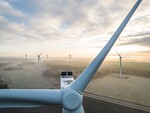Report: Science Doesn't Support Health Worries on Wind
As the number of wind turbines continues to grow across Iowa, researchers who evaluate public health hazards continue to find little scientific evidence to support claims of health problems caused by wind turbines.
“With the rapid expansion of wind energy, some neighbors to wind turbines have claimed the sound has affected their health. While — to some — the sound might be annoying, research studies have established no adverse health effects,” said Peter Thorne, a professor and head of the University of Iowa Department of Occupational and Environmental Health.
In just over 20 years, global wind electricity generating capacity has increased 88 fold — from 6,100 megawatts in 1996 to 539,123 MW in 2017. Production is focused in 10 countries that are responsible for more than 80 percent of all production and a small number of US states, including Iowa. A new paper by Thorne, David Osterberg of the Iowa Policy Project, and Kerri Johannsen of the Iowa Environmental Council reviews the health science on the issue.
The authors said the health questions for wind power — and for any energy technology — are important ones that deserve examination. But the paper concludes there is little scientific evidence that sound from wind turbines represents a risk to human health for neighbors. “The kinds of concerns we have heard are not surprising,” said co-author David Osterberg, lead environmental researcher for IPP and professor emeritus in the UI Department of Occupational and Environmental Health.
“As we note in the paper, new technology often must answer to the various effects it may have, on both economics and health. Too often the human and environmental impacts are separated from the economic questions, as we have seen with the substantial health burdens brought by fossil-fuel-based power generation. Most will agree that economic or technological progress should not introduce health problems,” stated Kerri Johannsen, energy program director with the Iowa Environmental Council. “To find if problems exist with wind electricity production, well-constructed scientific studies, rather than anecdotes or unsubstantiated sources, should be our guide.”
“A basic concept from the science of public health requires that a human health risk be a true hazard and that there is exposure to that hazard,” the report stated. “Wind turbines produce sound pressure, but if the frequency is at or below the threshold of human perception and the sound pressure level is low at area residences, there is little or no exposure to cause human health problems.”
The authors point to two authoritative peer-reviewed, surveys on the topic of wind turbines and health — a 2015 review by the Council of Canadian Academies and a 2014 report by Robert J. McCunney, a professor at the Massachusetts Institute of Technology (MIT) and several others. In the Canadian study, an expert panel of nine university professors and an engineering firm CEO evaluated available studies and literature. While the expert panel found sufficient evidence the wind turbines can cause annoyance, they also noted that current evidence is not sufficient to establish whether the level of annoyance is related to the visual impact of the turbines or other factors such as personal attitudes.
The authors of the Canadian review said studies completed so far do not measure noise independently from these factors. There is also a lack of data about baseline levels of annoyance without the turbines, the size of the annoyance effect, and how the impact changes in different wind and weather conditions. “That is an important point,” Osterberg said. “We need to be able to separate the scientific evidence that could affect an individual’s perspective.”
The MIT review found no evidence that people residing close to wind turbines experience disease outcomes but did find that some people experienced annoyance with the turbines or turbine noise, similar to the findings in the Council of Canadian Academies review.
However, this review also found that the percent of trial participants expressing annoyance varied. Those who received compensation for having turbines on their land reported little annoyance. Additionally, subjects who were shown websites and films purporting to show that turbines could cause health problems were more likely to report symptoms according to studies reviewed by these authoritative papers.
“Repeated scientific studies have shown that receiving misinformation about wind turbine health effects can actually cause people to experience symptoms,” said Johannsen. “It is critical that factual information on this issue is shared to avoid unnecessary suffering.”
The paper concludes that, “Given the evidence… and the well-documented negative health effects and environmental impacts of power produced with fossil fuels, we conclude that development of electricity from wind is a benefit. We have not seen evidence that wind turbines pose a threat to neighbors.”
The EHSRC/IPP/IEC report is available on the websites of the Iowa Policy Project at www.iowapolicyproject.org and the Iowa Environmental Council at www.iaenvironment.org/windhealth.
- Source:
- Iowa Policy Project
- Author:
- Press Office
- Link:
- www.iowapolicyproject.org/...
- Keywords:
- wind energy, health, safety, issue, Iowa, USA, study, Canada, professor


























